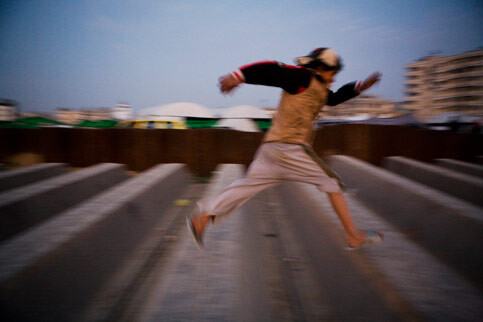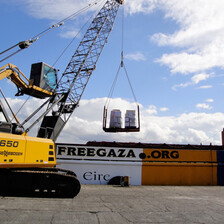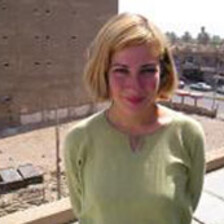The Electronic Intifada 11 December 2008

A boy runs along the downed Israeli-built wall along the border with Egypt after Palestinians broke the siege and destroyed the wall, January 2008. (Matthew Cassel)
International Human Rights Day is observed on 10 December, and it’s time we turned the rhetoric of human rights into reality. Together with the Free Gaza Movement, I am commemorating Human Rights Day this year in Gaza, a tiny strip of land wedged between Israel and Egypt, home to 1.5 million human beings, and subject to an increasingly brutal war being waged against its civilian population by the state of Israel.
We mounted this mission to give our solidarity to the people of Palestine and to highlight the strangulating conditions Israel causes in besieged Gaza. The inhumane effects of this siege threaten to stunt an entire generation — both in terms of physical and mental growth due to malnutrition, terrorization by bomb attacks, incursions and the use of sonic booms — but also in terms of the generation of students who have won places at academic institutions around the world but cannot fulfill them, and those undermined on the ground in Gaza by a lack of food, medicine, electricity, materials and the peace and space to make good use of them in.
The Free Gaza Movement is a grassroots movement of teachers, doctors, activists, union workers and other “ordinary” people who understand that we cannot wait for governments and other international organizations to present us with top-down solutions to the tribulations of the world, solutions which never quite seem to materialize. Since August, the Free Gaza Movement has been sailing ships from Cyprus to the Gaza Strip in acts of nonviolent resistance and civil opposition to the Israeli occupation and siege of Gaza.
This is direct democracy — the intervention of ordinary people in acts of solidarity capable of changing the world. From resistance in the streets of Greece against state brutality, to Chicago’s window factory workers taking back their workplace, to climate activists radically cutting CO2 at Stanstead, the Free Gaza Movement is one of several grassroots movements around the world facing a convergence of crises — climate change, capitalism’s evictions and social eviscerations, ongoing brutal wars and occupations and land, food and water struggles. In the face of these oppressions, workers, activists and academics are responding with a convergence of ideas. Slowly, painfully and joyfully, facing all the difficulties of organizing movements, we are showing that it is possible to resist and win gains. The unofficial slogan of the Free Gaza Movement and of many other grassroots movements is (with a hint of irony), “if we can do this, anybody can.”
All of us can and must work to break siege of Gaza. The vicious nature of the siege and ongoing occupation of Palestine demand nothing less. Accompanying the Free Gaza Movement on our present mission are Jonathan Rosenhead and Mike Cushman of the London School of Economics and the British Committee for Universities for Palestine, an organization of UK-based academics responding to Palestine’s call for an academic boycott of Israel.
Beyond the depravations, poverty and shortages caused by the blockade, over 700 Palestinian students are imprisoned in Gaza and are actively prevented by Israel from fulfilling a human right that belongs to every student on earth — the right to education, self-development and to serve the progression of collective learning, both for their community and the academic communities they will contribute to. They must be free to fulfill their rightful academic destinies and attend the universities which they have been accepted into.
Freedom of movement is a basic human right currently denied to Palestinians in Gaza. The humiliation of those trying to exit Gaza for medical treatment, the visitation of loved ones, and for the right to pursue education also creates the fear of never being able to develop, to learn, to survive, to live, and to love.
Though we carried in a ton of medical supplies and high-protein baby formula on our ship, our mission in Gaza this International Human Rights Day is not to provide charity. It is an act of direct resistance against the siege and a demonstration of our solidarity with the people of Palestine, break the silence of the world over this continuing calamity and physically break the blockade of Gaza. In the end, the oppression and humiliation of occupation assaults the humanity of us all and cannot and must not be tolerated any longer.
Ewa Jasiewicz is a writer, journalist, human rights activist and union organizer. She is currently in Gaza as a volunteer organizer with the Free Gaza Movement.





